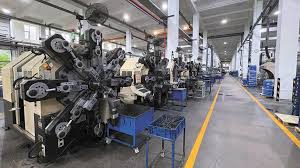By Liu Junguo, People’s Daily
Recently, Le Zhiguo, head of the robotics spring task force at Zhejiang Meili High Technology Co., Ltd. (Meili), visited several humanoid robot companies, including Unitree Robotics and Deep Robotics.
“Our purpose was to deliver prototype springs and deepen collaboration with downstream partners to jointly overcome technical hurdles,” stated Le.
Le explained that while many humanoid robot developers concentrate on core components like control systems (“brain”), motion coordination (“cerebellum”), and joint actuators, they often pay less attention to the flexibility of the body and limb systems. This oversight can result in operational issues such as overheating joints, unnatural movements, and reduced durability.
Recognizing this gap, Meili leveraged its expertise to assist. The company has already begun supplying small batches of prototype springs to several humanoid robot manufacturers. The solution for enhancing robotic flexibility and agility? A specialized spring, approximately one centimeter in diameter.
At first glance, this component may appear similar to conventional springs. “However,” Le clarified, “its strength and precision are significantly higher. When integrated into linear actuators, it enables smoother and more coordinated robotic movements.”
Le Zhiguo drew an analogy: if sensors provide a robot’s sense of touch and harmonic reducers function as its joints, then these high-precision, high-strength damping springs act like ligaments. They cushion joints, facilitate posture adjustment, and mitigate vibration and noise.
To accelerate this development, Meili established a dedicated robotics spring team earlier this year, drawing key technical experts from more than 120 R&D personnel. Within just three months, the team progressed from concept design to small-batch production, enabling Meili to supply springs to both domestic and international robotics companies.
How did the company manage to springboard into this new field so quickly?
“The foundation was built on over 35 years of experience in the spring industry,” explained Zhang Bihong, Founder and Chairman of Meili. “That solid expertise made our entry into a new sector possible.”
Founded in Ru’ao township, Xinchang county, east China’s Zhejiang province, Meili began as a small spring workshop. “We started by manufacturing springs for fire extinguishers, then progressed to motorcycle valve springs,” Zhang recalled.
In the early days, with few clients, Zhang often rode his bicycle along dusty country roads, visiting motorcycle parts factories one by one. Gradually, the company expanded into the automotive spring market.
In recent years, intensifying competition in the traditional spring market could no longer support the company’s growth ambitions. However, the rapid rise of China’s new energy vehicle (NEV) sector presented a new opportunity.
“To thrive, we had to ascend the value chain,” Zhang stated. Determined to move into higher-value products, he led the company to develop air suspension springs for NEVs – a segment with significantly higher technical barriers.
Air suspension systems, once exclusive to high-end vehicles, were long dominated by foreign companies. Despite having no prior experience in this field, the Meili team recognized that the market opportunity might be fleeting. The pressure to succeed was immense.
“The greatest challenge was improving the durability and air-tight sealing between the rubber airbag and the metal components. Both factors directly impact product quality,” said Li Xiaojun, head of the air spring project team.
“Another difficulty was ensuring stable performance under extreme conditions. Sometimes, lab data looked perfect, but during real vehicle tests, the damping materials failed to meet standards,” Li added.
“To enhance air-tightness and ensure the springs could withstand fatigue, heat, and cold, we tested more than 100 types of rubber materials,” Li explained. The team repeatedly refined designs, adjusted material formulas, optimized vulcanization processes, and tested structural options. After enduring 5.42 million cycles in rigorous alternating high- and low-temperature humidity tests, Meili successfully produced its first prototype air spring for passenger vehicles in 2024. The prototype passed customer validation later that year.
The company continues to innovate. “Robot springs offer even higher added value than automotive springs and could represent a new multi-billion-yuan market,” Zhang noted.
Through relentless innovation, this small component is springing into a world of broader possibilities.
Spring manufacturer in E China finds its bounce on new track of growth

Leave a Reply